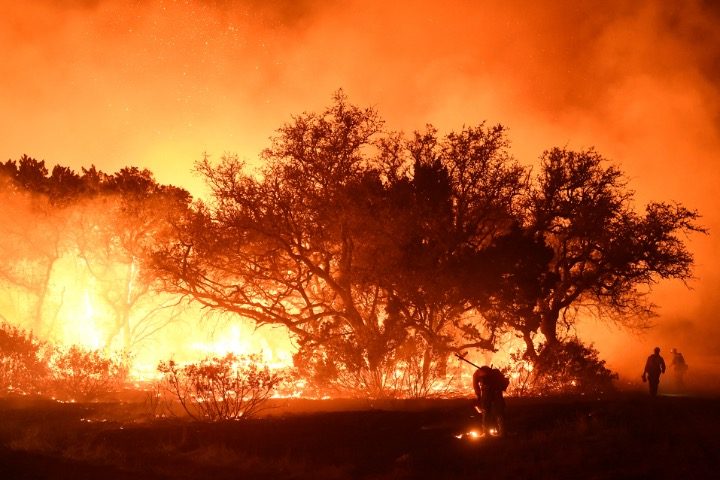
Over the past several weeks, climate cultists have made great hay by suggesting the recent spate of wildfires in Texas is due to climate change. As per usual with pronouncements made by the climate cult, the true reason for at least some of those fires in the Lone Star State is more nuanced than simply claiming, “Climate change did it!”
The Smokehouse Creek Fire, which has burned nearly 1,700 square miles in the Texas Panhandle and into western Oklahoma, looks as if it may have been caused by a downed power line operated by Xcel Energy, which boasts that, as of 2020, its energy mix is “47 percent carbon-free, including 27 percent of from wind, 13 percent from nuclear, 3 percent from solar, and 4 percent from other renewable sources, such as hydroelectricity.
Last week, Xcel acknowledged that its downed power lines were likely responsible for igniting the Smokehouse Creek Fire.
“Xcel Energy has been cooperating with the investigations into the wildfires and has been conducting its own review. Based on currently available information, Xcel Energy acknowledges that its facilities appear to have been involved in an ignition of the Smokehouse Creek fire,” Xcel admitted in a statement issued on Thursday.
The company denies any negligence in the maintenance of its power lines, but has encouraged those directly affected by the fire to file a claim.
“Xcel Energy disputes claims that it acted negligently in maintaining and operating its infrastructure; however, we encourage people who had property destroyed by or livestock lost in the Smokehouse Creek fire to submit a claim to Xcel Energy through our claims process. We will review and respond to any such claims in an expeditious manner, with a priority on claims from any person that lost their home in the Smokehouse Creek fire.”
A lawsuit filed on behalf of Stinnett, Texas, homeowner Melanie McQuiddy against Xcel and two other energy providers says differently, and claims the fire started “when a wooden pole defendants failed to properly inspect, maintain and replace, splintered and snapped off at its base.”
“As a result of the utility, powered utility lines hit the ground, igniting a fire, which spread quickly into an uncontrollable conflagration (“the wildfire in question”) which incinerated the nearby town of Canadian,” the lawsuit stated.
At least five more lawsuits have been filed against Xcel Energy, Southwestern Public Service (SPS) Company, and Osmose Utilities Services alleging similar mishandling of power lines in the area.
Another lawsuit states that “an old, rotten utility pole, owned and operated by the Defendant Xcel and/or SPS and located northwest of Stinnett, Texas, broke off below ground level and fell toward the ground. The electrical conductors attached to that fallen pole then contacted the ground, causing an electrical fault and arcing that ignited the Smokehouse Creek Fire.”
Although it has not been specifically named as the source of the fire, it should be noted that the Little Pringle II Wind Farm Power Plant is located northwest of Stinnett.
Xcel denies any connection with the Windy Deuce Fire in nearby Moore County.
According to the company’s statement, “Xcel Energy notes that the Windy Deuce fire reportedly impacted many structures in and around Fritch, Texas. Xcel does not believe that its facilities caused the ignition of the Windy Deuce fire, and we are not aware of any allegation that Xcel Energy’s facilities caused this fire.”
The Smokehouse Creek Fire has only claimed two lives thus far, but it has wreaked untold havoc among the area’s cattle ranches.
“We’re still trying to tally up the cattle losses,” said Dale Smith who operates a ranch in the area. “It burned probably 70-80% of the ranch.”
“These fires are becoming a regular occurrence. Lives are being lost. Livestock are being lost. Livelihoods are being lost. It’s a sad story that repeats itself again and again, because public utility companies and oil companies responsible for these power lines aren’t keeping them maintained,” Smith said.
Hysterical climate zealots would have you believe that mankind’s emissions from burning fossil fuels are solely responsible for the perceived increase in wildfires globally. But whether it’s these fires in Texas or fires in California, Maui, Canada, or even Europe, closer inspection often shows that such fires are caused by other things — most notably mankind.



